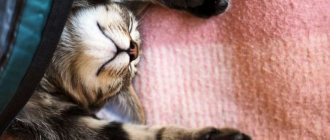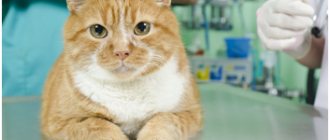Vaccination – one of the most important procedures for caring for domestic cats. This preventive measure helps prevent the development of the most dangerous feline diseases, leading to serious health consequences and premature death. Vaccinations for cats are done in veterinary clinics according to the vaccination calendar. The owner needs to properly prepare the animal for the procedure and follow all the doctor’s recommendations regarding caring for the cat after vaccination.
In the article we will look at why cats need vaccinations, how to prepare the animal for the procedure, recommendations for vaccinating cats depending on age, and types of medications.
Why is cat vaccination necessary?
Vaccination of cats is an effective measure to prevent a number of diseases, aimed at stimulating the production of antibodies that destroy active viruses that enter the animal’s body in case of infection. Simply put, vaccinations develop immune protection against various infections that provoke the development of deadly diseases.
In veterinary clinics, domestic cats are vaccinated at the request of the owner himself, who wants to protect his pet from the risks of contracting infections.
Vaccinations are recommended for all domestic cats without exception, even those who do not go outside at all. Viruses can spread through food and water. Even the most caring owner can become the culprit of a cat infection, bringing a dangerous infection into the house on clothes or the soles of shoes.
Where can you get vaccinated?
Currently, almost every private and public veterinary clinic provides kitten vaccination services. But who is better to trust? Most kitten breeders prefer private specialists, and there are good reasons for this.
It is believed that paid offices are cleaner. Although such a judgment is subjective. In addition, private veterinarians purchase more expensive vaccine preparations, devote more time to preliminary examination of the furry patient, as well as advice regarding the post-vaccination period and care of the kitten. If you have the financial opportunity, it is better to do it for a fee.
The most responsible cat owners prefer to vaccinate their pets at home. To do this, they call a doctor at home. Indeed, this method of vaccination is the safest; the pet is protected from contact with sick animals and is not exposed to the stressful situation associated with traveling in transport. The only negative is that such a technique will require considerable material investment.
Read. Rabikan anti-rabies vaccine for cats and dogs
What diseases are vaccinated against?
According to the vaccination calendar, cats are recommended to be vaccinated according to age against several of the most dangerous diseases.
What diseases is it recommended to vaccinate your cat against?
- Rabies (rabies) is a deadly infectious disease that cannot be cured. Manifests itself with severe symptoms that occur 2-3 days after infection. Infected animals and rodents are carriers of the infection.
- Rhinotracheitis is a herpesvirus infectious disease that affects the respiratory and visual organs. Has an acute course. The carriers of the virus are sick cats. Mortality occurs in 20% of cases.
- Calcivirosis is a common infectious disease of cats, transmitted from other members of the genus who are carriers of the insidious virus. The risk of death is more than 80%.
- Viral peritonitis is an infectious disease caused by coronavirus. Infection occurs through airborne droplets after contact with a carrier of the infection. The risk of death is very high (more than 90% of cats die).
- Panleukopenia is an acute viral disease also known as feline distemper. Sick or already ill cats serve as spreaders of infection. Difficult to treat. Causes critical symptoms. The risk of death is 90%.
- Chlamydia is a contagious feline disease of an infectious nature with a severe and long-term course. The main carriers of infection are birds and rodents. The disease affects the genitourinary, respiratory, visual and digestive systems. There are risks of infecting people.
- Microsporia is a skin disease also known as ringworm. Carriers of infection are sick animals. A cat with microsporia often infects its owner. The most popular drugs for vaccinating cats against various infections: Nobivak, Quadrikat, Multifel-4, Microderm, Leukotsel, Felovax-4, etc. The drug will be selected by the attending veterinarian.
Types of cat vaccines
The following vaccines are most often used to vaccinate kittens:
- Nobivac Forcat. A multicomponent vaccine that stimulates immunity in kittens to calicivirus, panleukopenia, rhinotoacheitis and chlamydia;
- Nobivac Tricat. Triple action vaccine against calicivirus infection, rhinotracheitis and panleukopenia. The first vaccination for kittens is given at the age of 8 weeks. Revaccination (repeat vaccination) should be carried out annually;
- Nobivac Tricat. It also protects the little furry from the four main diseases listed. The first vaccination for a kitten can be given at the age of 12 weeks;
- Nobivac Rabies. This type of kitten vaccine only protects against rabies. The animal develops stable immunity 21 days after vaccination. Revaccination should be carried out annually. It is acceptable to mix Nobivak Rabies with other types of Nobivak vaccines;
- FORT DODGE FEL-O-VAX IV. This is a polyvalent vaccine - against several infections. Is inactivated. Protects the cat immediately from rhinotracheitis, panleukopenia, calicivirus and chlamydia. Approved for use in kittens over 8 weeks of age. Revaccination is carried out once a year;
- Purevax RCP. A multicomponent vaccine, which included strains of rhinotracheitis, panleukopenia and calicivirosis.
- Purevax RCPCh. Contains weakened strains of the viruses listed above. The vaccine is given at the age of 8 weeks. A month later they repeat. In the future, revaccination is indicated once a year.
- Leucorifelin. Protects the animal from viral viruses and panleukopenia. It is prohibited to administer Leucorifelin with other vaccines;
- Quadricate. Vaccination for kittens against panleukopenia, rabies and calicivirus. The kitten's immunity is formed in 2-3 weeks. Repeated vaccination is carried out every year;
- Rabizin. This drug is only for rabies. Unlike other types of vaccines, Rabizin can be administered even to pregnant cats;
- Leukocel 2. Vaccine against leukemia in cats. The vaccine is given twice. Then revaccination is carried out once a year. Kittens are vaccinated at the age of 9 weeks;
- Phelocel CVR. The drug stimulates the production of immunity against rhinotracheitis, panleukopenia and calicivirus. The vaccine looks like a porous mass of pale yellow color. Before use, it is diluted with a special solvent;
- Microderm. The vaccine allows you to protect the animal from dermatophytosis (lichen, etc.).
Important: it is worth remembering that young cats under 3 years of age, as well as old and weakened animals, are always at risk.
Vaccination calendar for cats
Cats are vaccinated according to the preventive vaccination schedule according to age. Based on individual indications, the veterinarian can adjust the timing of immunization.
Vaccination schedule for cats:
- Panleukopenia, calcivirosis, chlamydia and rhinotracheitis - vaccination at 8 weeks, revaccination at 10-12 weeks and then after 12 months every year.
- Rabies - first vaccination at 12 weeks, revaccination annually.
- Microsporia - vaccination at 8 weeks, revaccination after 2 weeks and then every year.
- Viral peritonitis - first vaccination at 16 weeks, again after 4 weeks. Revaccination annually.
Contraindications
Vaccination of cats is carried out only when the animal is completely healthy. There are a number of contraindications that must be taken into account:
- You should not vaccinate a kitten when its teeth change (between 4-8 months);
- elevated temperature;
- physical exhaustion;
- diseases in acute or chronic form;
- the previous injection was given less than three weeks ago;
- helminthic infestation.
You should not take risks and vaccinate if your cat has recently had surgery.
Vaccination rules
To ensure that the immunization procedure does not provoke side effects and complications, it is necessary to follow some rules for the safe vaccination of animals.
Basic rules of the preventive procedure:
- It is not recommended to vaccinate small kittens under 2 months of age.
- The vaccination is performed only by a veterinarian after examining the pet and studying its medical record.
- Vaccinations can only be given to healthy animals. The cat should be alert and active, have a good appetite and normal body temperature. If the examination reveals any symptoms of illness, vaccination is postponed for a certain period until complete recovery.
- To achieve high effectiveness, the cat must be vaccinated again after a certain time interval (re-vaccination).
- The drug to be administered to a pet should be chosen by an experienced veterinarian, based on personal experience and taking into account the individual health status of the cat.
- Before the immunization procedure, the animal must be properly prepared, following the doctor’s recommendations.
Is it possible to inject yourself?
Experienced breeders do not recommend vaccinating themselves, especially regarding rabies. It is no secret that many pets experience a trip to a specialized clinic negatively, and an injection at home, at first glance, is an excellent solution. But in a specialized institution they will not only give the animal an injection, but also conduct a clinical examination, thermometry and make sure that the cat is healthy.
In addition, if a cat suddenly has an allergic reaction, the animal will immediately receive qualified assistance. After the injection, the veterinarian will make a note in the pet’s passport. It will include the processing date, name, series and number of the vaccine. The mark is confirmed by the signature and seal of the institution. Only such a passport will allow the animal to participate in exhibition events and freely cross the borders of the country.
Veterinary passport.
If the cat is very worried, nervous during transportation and in an unfamiliar place, you can use the service of calling a specialist to your home.
What to do after vaccination
For 10 days after vaccination, you should quarantine, that is, exclude the cat from walking outside and any contact with animals. The pet should be protected from stress and hypothermia should be avoided. Particular attention should be paid to the proper nutrition of the cat. The diet should be balanced and complete.
If a cat experiences side effects after vaccination, it should be shown to a veterinarian. The doctor will conduct an examination, determine the cause of the symptoms, select a treatment course and decide on a further vaccination schedule. It may be necessary to revaccinate with a different vaccine.
Immunizing your pet before traveling
When planning a trip with your pet, you need to get a certificate from the veterinarian with information about the vaccination performed. Such documentation will be needed to purchase a ticket for any public transport traveling long distances.
The immunization document must be issued in accordance with the law and include information about the vaccinations given to the cat. If the trip is made to another region of the state, obtaining a certificate from a veterinarian is an indispensable condition.
Vaccinations for cats: pros and cons
Before deciding to vaccinate a domestic cat, the owner can weigh the pros and cons of this procedure.
Benefits of animal immunization:
- The risk of contracting dangerous infections is reduced.
- The immune system is strengthened.
- The risk of infection to people from a sick cat is eliminated.
- After vaccination, the owner does not have to worry about the health of his children and the cat, which often walks outside.
- If the animal does become infected, the disease will be milder and will not cause complications or death.
The disadvantages of vaccinating cats are minor. These include the risks of side effects and complications after vaccination. As a rule, such consequences of animal immunization occur in very rare cases. If you follow all the doctor’s recommendations and select a high-quality vaccine to administer, you can be confident that the preventive procedure is safe for your cat.
What to vaccinate with?
There are two types of vaccines - “live” and “dead”.
Live vaccines contain a weakened live virus. Live vaccines are prepared from apathogenic pathogens weakened under artificial or natural conditions. Viruses lose their pathogenic properties and lose the ability to cause infectious diseases, but retain the ability to reproduce. An infection artificially caused by the introduction of a vaccine continues for a certain time, is not accompanied by a clinical picture of the disease and stimulates the formation of immunity to pathogenic strains of microorganisms.
Live vaccines create longer-lasting and stronger immunity than inactivated (dead) vaccines.
When using live vaccines, keep the following points in mind:
- Spontaneous mutations. During the multiplication of the virus in the cat’s body, unpredictable changes in the genetic structure and the return of virulence (pathogenicity) of a given microorganism are possible. In this case, the cat will get really sick.
- Coinfection (joint infection) with a “wild” virus. Simultaneous infection with a vaccine virus and a wild one is very dangerous, although unlikely.
- If the cat's immune system is weakened, vaccination may lead to the development of the disease.
Due to the fact that live vaccines are made on the basis of living microorganisms, a number of requirements must be observed to ensure the preservation of the viability of microorganisms:
- live vaccines should be stored and transported at a temperature of 4-8 ° C;
- freezing live vaccines does not affect their properties;
- live vaccines quickly lose their immunogenic properties at room temperature;
- loss of vacuum (violation of the integrity of the ampoules) can lead to the death of the drug.
Inactivated (dead) vaccines contain the entire microorganism that has been killed. Viruses are killed by physical (temperature, radiation, ultraviolet light) or chemical (alcohol, formaldehyde) methods.
For “dead” vaccines, immunity begins to develop immediately after administration, for “live” vaccines - on the 6-7th day: in the first days, viruses actively multiply, and only then an immune response begins to develop.
“Dead” vaccines are not able to multiply in the body: immunity is developed from the small number of killed microbial bodies (or their fragments) that are introduced. In this regard, dead vaccines are safe - they cannot lead to the development of a viral disease. But at the same time they cause less effective and long-lasting immunity.
The safety of dead vaccines can also be questioned: chemicals added to boost immunity can cause serious adverse reactions and complications in the liver and/or kidneys.
The question of the comparative safety and effectiveness of “live” and “dead” vaccines remains open.
The next vaccination is carried out when the kitten is one year old, it includes a comprehensive vaccination and a rabies vaccination. Then every year you need to repeat these two vaccinations without revaccination. In this case, the animal will be protected from all common infections.
The list of vaccinations for cats includes mandatory and recommended vaccines:
- The mandatory list includes vaccines against panleukopenia, calicivirus, rhinotracheitis and rabies. Rabies vaccination is always given separately, other infections are vaccinated with a polyvaccine;
- The list of recommended vaccinations includes the fairly common chlamydia and leukemia.











